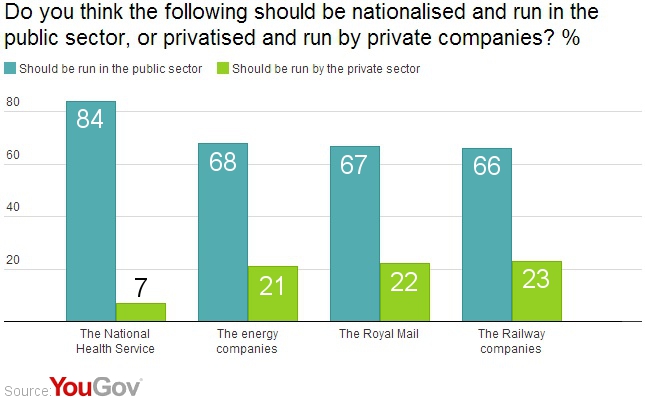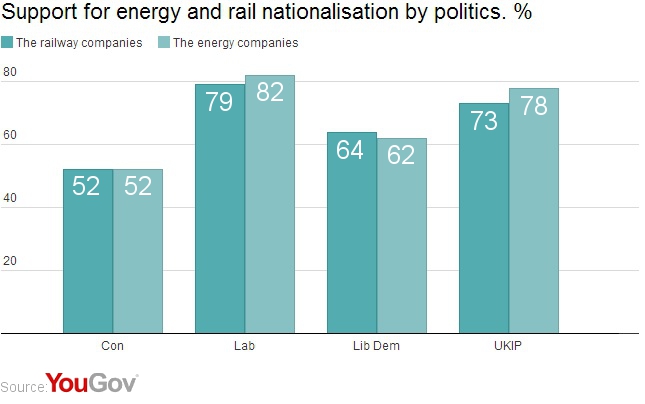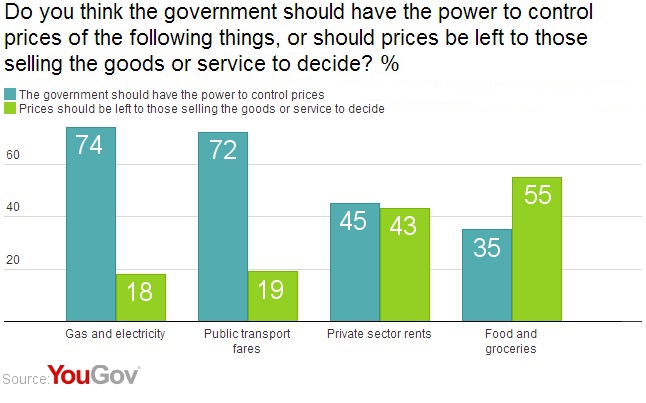One of the best lines in Leanne Wood's speech at the Plaid Cymru conference last month was:
"The Wales that we want to create will be operated by a fairly fundamental principle: that services run for the benefit of people can only be properly managed in the interests of the people."
She didn't use the exact word "owned" by the people, but it was clear from what she went on to say that the model that best seems to fit our circumstances now is that of a non-profit-distributing company along the lines of Glas Cymru ... which is effectively the same thing.
-
I don't quite know how I missed it at the time, but only a few weeks ago YouGov conducted a survey about public ownership and control of key sectors and services. The results are summarized here, and the full details are here.
These are the levels of support for public ownership and management of four key sectors:

This graphic shows the level of support for public ownership and management of energy and rail services by voting intention for political parties:

I think two things are surprising. The first is that even a majority of Conservative voters support nationalization of energy and rail services. In fact the margin of support is bigger than the graphic might suggest, for only 39% of Conservative voters wanted railways to continue to be run by private companies, and only 38% wanted energy to continue to be run by private companies. The rest were undecided.
The second surprise, to me at least, is that such a high percentage of UKIP voters are in favour of nationalization.
-
Another set of questions was about whether government should have the power to control prices:

Although the margin favour of private sector rent control was quite small, public opinion ties in exactly with what Leanne said at conference:
"Due to the failure of successive Governments to build sufficient council housing and cool the housing market, many young people are forced to rent from private landlords well into their twenties and thirties. This is Generation Rent.
"There are 190,000 households renting in Wales. 14% of all households are in the private rented sector.
"Even during this long recession, rent rises have continued to outstrip inflation. In Wales over the last year rent has on average risen by 5%, well above the UK average.
"This is completely unsustainable. I am therefore announcing our intention today to reintroduce rent control for the private rented sector during the next Assembly term."
These are ideas whose time has come, and it should be clear to everyone that we in Plaid Cymru have our finger on the pulse of public opinion to a far greater extent than other parties.



10 comments:
I found out about the poll from Radical Independence, who have a conference this weekend in Scotland.
Unfortunately, YouGov lumps Wales in with the English midlands, so we don't know what the figures for Wales would be. But I would guess that they are higher than for the UK as a whole, though private rent control is a particularly big issue in London.
I've just Googled to find whether this poll was reported in the mainstream media at the time. As far as I can see, it wasn't. All that came up apart from some local reporting was this buried in the Guardian and this in Conservative Home. It wasn't exactly headline news.
The Welsh figures are almost certainly higher than the UK ones. What we need is a model where state organisations can still raise finance outside of public expenditure, so they can remain innovative. This should be pursued within strategic public ownership, not through privatisation.
If Plaid has its 'finger on the pulse of public opinion' then I, for one, am delighted.
But who really represents Plaid these days? Leanne Wood? DET? The guy from Anglesey? Me? You?
No, Plaid Cymru is just a vehicle we all use to try to advance our own fortunes. True capitalism in all but name!
You seem to have hit the nail on the head, Anon 11.54
Leanne is the leader of the party, elected by the membership, therefore she represents the party rather more than the likes of Dafydd Elis-Thomas or Rhun ap Iorwerth.
But Plaid is a democratic party, which means that no-one in it, not even the leader, can determine policy from the top down. That is something for conference to determine; which means the membership, as every member is entitled to attend and vote. So, in the terms you've used, Plaid is probably the least "capitalist" of all parties. It is much more a collective or cooperative party.
-
Every party has people who will try and use it as vehicle to advance their own fortunes. In itself, this doesn't necessarily involve any conflict of interest, as politics is something that takes enormous time and dedication, and talented individuals could probably make a lot more money putting their energies into a different career. Therefore a degree of reward is perfectly acceptable.
The real question is whether candidates who get elected on a Plaid Cymru platform hold true to the values and the policies of the party, or whether they then ignore the party and advance their own agendas instead. Open and honest disagreement on a few matters is not too much of a problem, but dishonesty and misrepresentation of the party's policies should never be tolerated.
It infuriates me that, after nearly 15 years of political devolution, Wales is still lumped in with the English midlands in political polls.
How far do we take this principle though? The reality is private and public sectors are on a continuum in terms of public service delivery rather than the black and white argument we're often presented with. The ultimate aim should be to get the best service possible for citizens, in the most cost effective way. Whether that private or public is secondary.
Whether that is*
I think it matters a lot whether things are run primarily for the benefit of citizens or primarily for the benefit of making profits and distributing those profits to private shareholders.
As for there being a continuum, I wouldn't disagree. And yes, there is room for discussion about where line should be drawn. But it seems absolutely clear to me that energy, public transport and monopoly services should be on the public side of the line.
A party like Plaid Cymru, which has "to ensure economic prosperity, social justice and the health of the natural environment, based on decentralist socialism" as its second fundamenatal aim after independence (and it is perhaps worth noting that we put this before the language), will obviously see the line being drawn to include more rather than less run for the benefit of the public rather than private shareholders. But what this poll shows is that the public at large, even Tory supporters, would draw the line so that energy and the railways are on that side of the line.
But then why do the other parties actually do the exact opposite of what those who vote for them want, or do nothing to redress past privatizations? This is a vote winner for Plaid, and we should be shouting it from the rooftops.
Sorry, I missed BoiCymraeg's comment. It might be infuriating, but there are reasons for why Wales is not included separately. As we only have 5% of the UK population the sample base in a typical poll of 1,000 would be too small to be able to draw many firm conclusions.
But the same is actually true for Scotland as well, with only 8.5% of the UK population. So there is an anomaly. Perhaps the best answer is to make the minimum acceptable sample base 2,000 rather than 1,000. But polls would then cost more.
As it happens, the base of this poll was 1,736.
Post a Comment